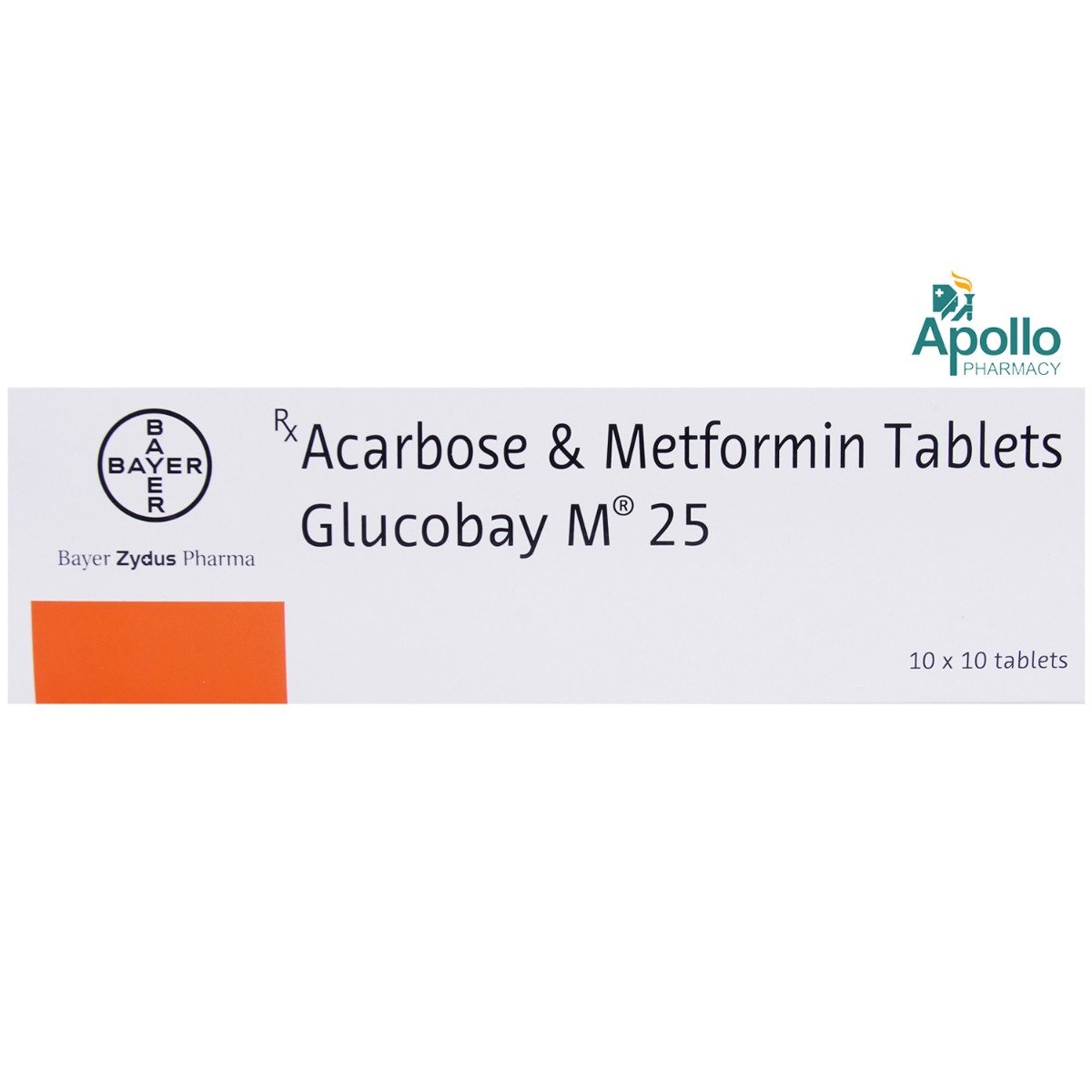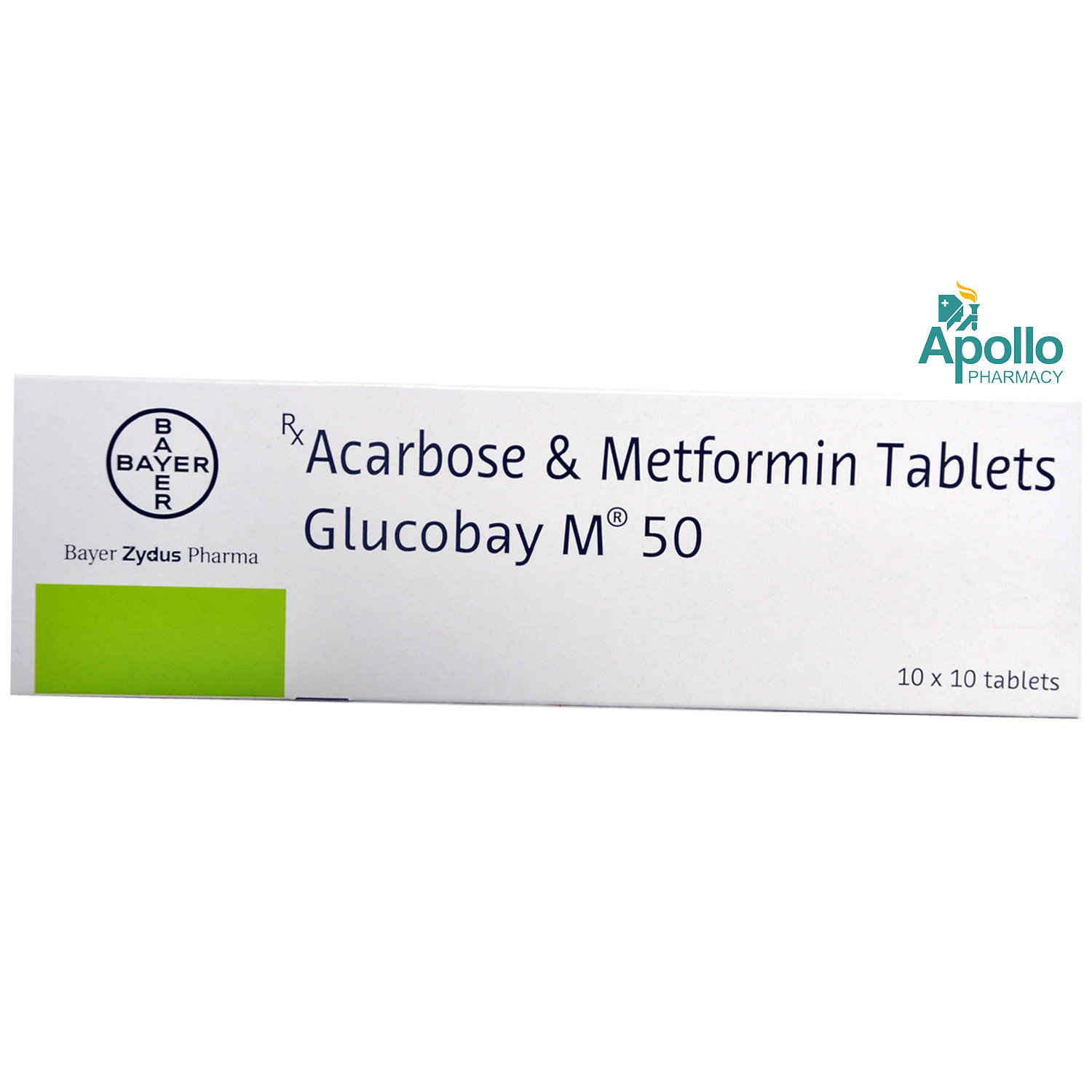Acarbose+metformin
About Acarbose+metformin
Acarbose+metformin is indicated for the management and treatment of type 2 diabetes, especially in people whose sugar levels are too high and cannot be controlled alone by diet and exercise.
Acarbose+metformin contains Metformin and Acarbose. Metformin works by reducing the amount of blood sugar released in the bloodstream by the liver, and Acarbose works by slowing down the action of intestinal enzymes responsible for the digestion of complex sugars/glucose.
Acarbose+metformin may cause side effects like diarrhoea, flatulence, and abdominal cramps. Most of these side effects do not need medical attention and will resolve over time. However, consult your doctor if the side effects persist or worsen.
Do not take Acarbose+metformin if you are allergic to any of its components. Consult your doctor if you are pregnant or breastfeeding. Keep your doctor informed about your health condition and medications to prevent any potential interactions.
Uses of Acarbose+metformin
Medicinal Benefits
- Acarbose+metformin helps lower and maintain blood sugar levels in patients with type 2 diabetes not adequately managed by diet and exercise alone.
- Acarbose is an alpha-glucosidase inhibitor which delays the digestion and absorption of carbohydrates in the intestine, preventing sharp rises in blood sugar after meals.
- Metformin is a biguanide which improves glucose tolerance, reduces glucose absorption in the intestine, decreases sugar production in the liver, and enhances glucose utilisation by the body.
- Acarbose+metformin provides consistent, gradual blood sugar control suitable for long-term use with minimal side effects.
- It helps reduce the risk of diabetes-related complications, including eye damage (diabetic retinopathy), kidney damage (diabetic nephropathy), nerve damage (diabetic neuropathy), delayed wound healing and diabetic foot ulcers.
Directions for Use
- Acarbose+metformin should be taken with meals to prevent stomach upset.
- Follow your doctor's instructions on the dosage and timing of this medication.
- Swallow Acarbose+metformin as a whole with a glass of water.
- Do not crush, chew, or break it.
Storage
Side Effects of Acarbose+metformin
- Flatulence (gas)
- Abdominal cramps
- Diarrhoea
Drug Warnings
- Do not take Acarbose+metformin if you are allergic to any of its components.
- Tell your doctor if you have kidney disease, high ketone levels in blood or urine, heart disease, congestive heart failure, liver disease, or if you are using insulin or other oral diabetes medications.
- Acarbose+metformin may cause lactic acidosis, which occurs due to the overproduction of lactic acid in the blood. If you notice any symptoms, please tell your doctor.
- You should take small, frequent meals and don't fast while being treated with Acarbose+metformin.
- If you experience symptoms of hypoglycemia (low blood sugar) like sweating, dizziness, dry mouth, dry skin, palpitations, shivering, intense thirst, frequent urination, etc., immediately take 5-6 candies or honey/sugar and consult with a physician.
- Consult your doctor if you are pregnant or breastfeeding.
- Inform your doctor if you are taking any other medicines, including supplements and herbal products.
Drug Interactions
Drug-Drug Interaction: Inform your doctor if you are taking antibiotics (neomycin), heart-related medicines (digoxin), antidiabetic drugs (metformin), drugs used to treat high cholesterol (cholestyramine), digestive enzymes (lipase, pancreatin, amylase), or intestinal absorbents (charcoal).
Drug-Food Interaction: No interactions found.
Drug-Disease Interaction: Persons dealing with ulcerative colitis or Crohn’s disease (conditions causing swelling of the bowel, severe kidney or liver disorders, diarrhoea, bowel pain, vomiting, and weight loss) and a large hernia (bulging of a tissue or organ through an unusual opening) in the intestine should discuss with a doctor before using Acarbose+metformin.
Drug-Drug Interactions Checker List:
Safety Advice
Alcohol
unsafeYou should avoid consuming alcohol with Acarbose+metformin as it may lead to high or low blood sugar levels.
Pregnancy
cautionAcarbose+metformin is a Category B pregnancy drug that is not recommended for pregnant women or given only under the strict guidance of the doctor, as there is no clinical data available on use in pregnant women.
Breast Feeding
cautionAvoid nursing your baby while taking Acarbose+metformin as this medicine may pass in breast milk.
Driving
safe if prescribedAcarbose+metformin does not affect your thinking or driving ability.
Liver
cautionInform your doctor if you are dealing with Liver diseases/conditions, as your doctor may adjust the dose as required.
Kidney
cautionTake Acarbose+metformin after the recommendation of a doctor, especially if you have a history of Kidney diseases/conditions. The dosing strength needs to be adjusted by your doctor as required.
Children
unsafeThe use of Acarbose+metformin is unsafe for children below 12 years.
Habit Forming
Diet & Lifestyle Advise
- Engage in regular exercise like cycling, running, walking, jogging, dancing, or swimming for at least 30 minutes. Try to invest at least 150 minutes weekly in exercise.
- Maintain a healthy body weight to avoid obesity or high blood sugar, which can increase the risk of the onset of diabetes.
- Consume a low-fat and low-sugar diet. Replace carbohydrates with whole grains, fruits, and vegetables, as carbohydrates are changed into sugars, leading to high blood sugar levels.
- Try to avoid potatoes as they are high glycemic foods that increase the risk of high sugar in the blood.
- Limit the consumption of alcohol and quit smoking.
Special Advise
You should have a Glycated haemoglobin (HbA1C) test every 3 months to check your blood glucose level control.
Patients Concern
Disease/Condition Glossary
Type 2 diabetes: It is a chronic or life-long condition in which cells of the body fail to respond to insulin, and in later stages, the body even fails to produce enough insulin. It accounts for approximately 90% of total diabetes cases. This condition makes the body rely on different energy sources in muscles, tissues, and organs. This disease develops gradually, and the early symptoms include constant hunger, lack of energy, fatigue, weight loss, excessive thirst, frequent urination, dry mouth, itchy skin, and blurry vision. People who are middle-aged or older are most likely to have type 2 diabetes, so it is also called adult-onset diabetes. The risks of uncontrolled type 2 diabetes include damaged retina of the eyes or blindness, loss of limbs, nerve problems, kidney problems, sexual dysfunction, and an increased possibility of heart attack or stroke.
FAQs
Acarbose+metformin is used for the management and treatment of type 2 diabetes.
Avoid taking digoxin with Acarbose+metformin, as it may lead to serious drug interaction. Consult your doctor if you need to take both medicines together, your doctor may adjust the dose appropriately to use safely.
Acarbose+metformin works by reducing the amount of blood sugar released in the bloodstream by the liver and slowing down the action of intestinal enzymes responsible for the digestion of complex sugars/glucose.
Acarbose+metformin is contraindicated in the condition of diabetic ketoacidosis or lactic acidosis, as it may lead to overload of acids or ketones in your blood, leading to severe life-threatening conditions, as the kidneys may not be able to remove it.
You should try to take small meals at regular intervals and should not skip your meals, as it can help Acarbose+metformin work more effectively by utilising glucose in the right manner. Fasting is dangerous for a diabetes patient taking Acarbose+metformin as it would lower the blood sugar level, leading to hypoglycemia.
No, a person should continue taking Acarbose+metformin as much as the doctor has prescribed for the treatment of type 2 diabetes. You should not stop discontinuing Acarbose+metformin suddenly, as it may worsen the symptoms of type 2 diabetes and increase the blood sugar level, leading to hyperglycemia.




